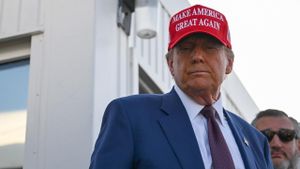U.S. President Donald Trump announced on February 3, 2025, his intention to cut off all future funding to South Africa due to concerns over the country’s land expropriation policies. This statement came shortly after South African President Cyril Ramaphosa signed the controversial Expropriation Bill, which allows for state-led land expropriation aimed at addressing historical inequities.
On his Truth Social platform, Trump expressed deep concern about the situation, stating, "South Africa is confiscATING land and treating certain classes of people very badly." He underscored his stance by declaring, "The United States won't stand for it. We will act." His comments have raised alarm not only within South Africa but also on the international stage, contributing to economic fluctuations, including the rand’s near two percent decline against the dollar.
According to Trump, this action is predicated on what he described as "massive human rights violations" happening within South Africa, adding weight to his pledge to curtail aid until there is evidence supporting his claims through thorough investigation. The decision to withhold funding marks one of Trump's several threats to impose economic consequences on countries over certain policies and has potential ramifications, particularly with South Africa currently chairing the G20.
The Expropriation Bill simplifies the process by which the South African government can claim land, potentially without compensation, which many critics argue effectively paves the way for expropriation without just recompense. This move has spurred significant backlash, especially from opposition parties like the Democratic Alliance (DA) and the civil rights organization AfriForum, both of which are cautious about what the bill entails for property rights.
Opponents, including the DA, have characterized the legislation as valuable but also threatening, contending it grants excessive powers to the state to seize property. The Institute of Race Relations has called it "a frontal assault on property rights"—a sentiment echoed by Public Works Minister Dean Macpherson, who stated, "There will be no expropriation of private property without compensation on my watch." This conflict showcases the sensitive nature of land ownership issues rooted in South Africa’s complex and often painful history.
Following Trump’s announcement, South Africa's rand weakened significantly, prompting immediate economic concerns. The news sparked wider discussions on U.S.-South Africa relations, particularly considering South Africa's position as one of the BRICS nations—a political and economic bloc which Trump had previously threatened with economic sanctions.
South Africa’s foreign ministry quickly responded, articulately defending the Expropriation Act and expressing hope for Trump's advisers to gain accurate insights about the situation pertaining to land expropriations. Officials have emphasized the government’s responsibility to address historical disparities and the necessity of land reform as central to rectifying longstanding inequalities from colonialism and apartheid.
Land expropriation is not without precedent; previous policies have aimed to redress land ownership inequities skewed toward the country’s historically marginalized populations. The current legislative changes have revived fears reminiscent of Zimbabwe’s land reform failures, where land seizures led to economic ruin rather than improvement.
The local ramifications of Trump's announcement are pronounced, as any funding cuts could significantly impact resources allocated for HIV/Aids treatment and other key areas where U.S. support has been indispensable. Historical funding dynamics reveal substantial investments—over $8 billion directed toward South Africa over the past two decades, aimed mainly at public health initiatives, infrastructure, and education.
Looking forward, this episode may shape South Africa’s economic strategy and diplomatic engagements, particularly as it seeks to bolster international relations amid increasing scrutiny from its largest donor country. The internal political environment will also be under close watch, as Ramaphosa balances the demands of reform with the repercussions of global perception and investor confidence.
While the South African government maintains its commitment to equitable land reform, the friction ignited by Trump’s declarations of funding cessation complicates the discourse, necessitating careful navigation of both domestic and international landscapes. With Trump remaining influential among global leaders, the ensuing negotiations could evolve not just around land, but also economic collaboration and global political alignments.



